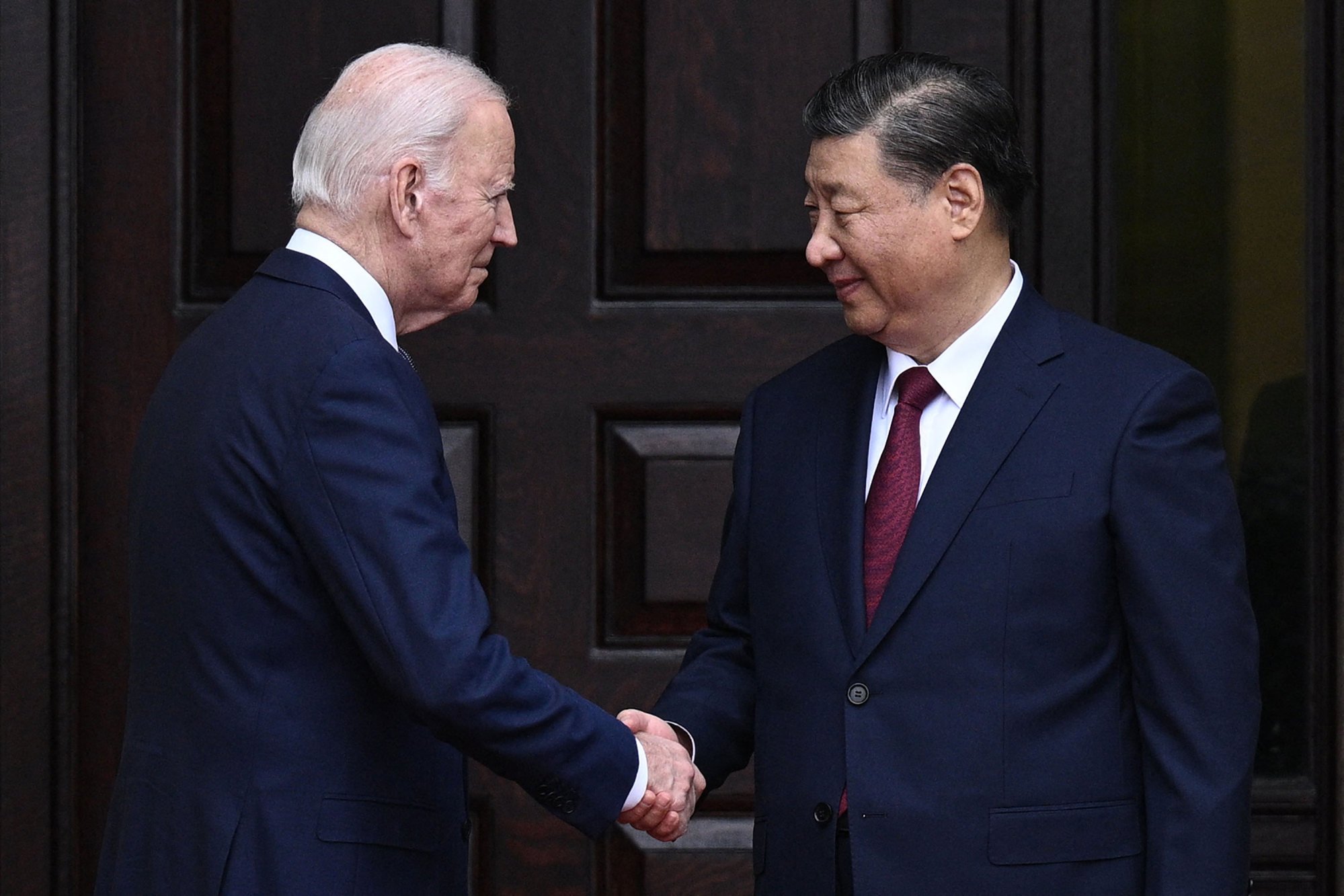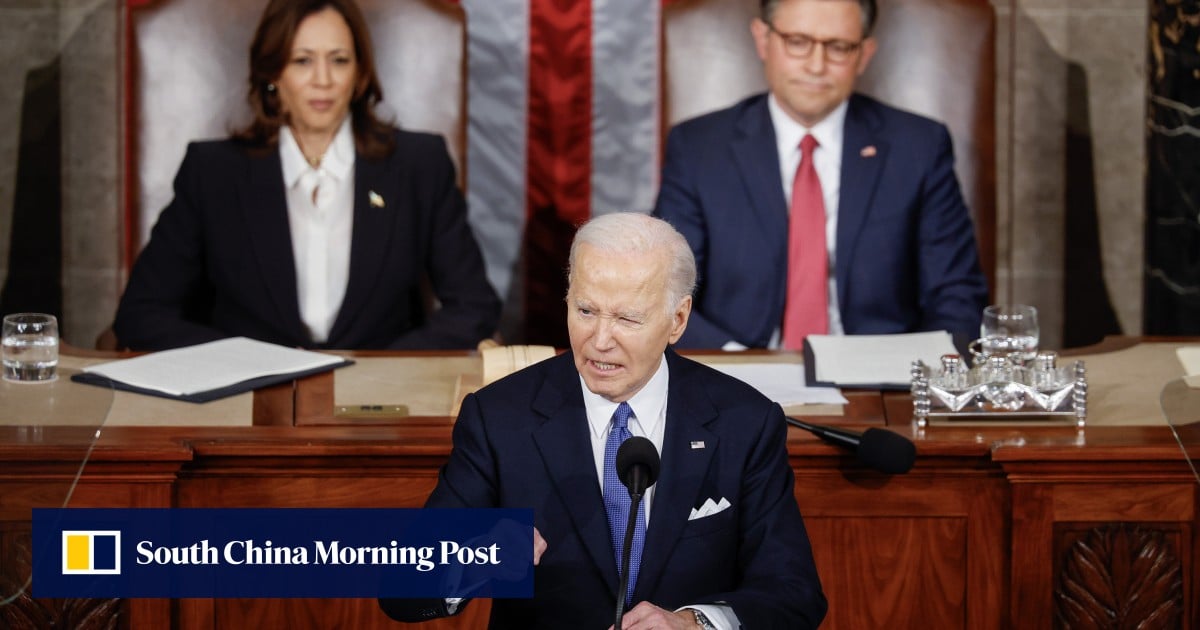“For years, all I’ve heard from my Republican friends and so many others is [that] China’s on the rise and America is falling behind. They’ve got it backward,” he said.
Highlights from Biden’s 2024 State of the Union speech
Highlights from Biden’s 2024 State of the Union speech
Eliciting a standing ovation from his party colleagues, Biden pointed out that his administration was not only “standing up against China’s unfair economic practices”, and for peace and stability across the Taiwan Strait, but also revitalising partnerships and alliances in the Pacific and preventing China from using most advanced American technology.
“Frankly for all his tough talk on China, it never occurred to my predecessor to do that,” he said of former president Donald Trump, who appears most likely to get the Republican Party’s presidential nomination.
On Thursday, Biden opened by castigating Republicans for blocking aid to Ukraine and his “predecessor” for saying Russia could attack Nato allies, and then turned at length to domestic issues: lashing out at the January 6, 2021, insurrection, curtailed access to abortion and high prescription drug prices.
He celebrated legislation that he signed into law, the Chips and Science Act that was written to reduce America’s reliance on foreign chips, which are primarily manufactured in Asia.
Biden also acknowledged that the US had lost many manufacturing jobs under Republican and Democratic administrations, an issue that Trump blamed on China during his successful bid for the White House in 2016. The former president brought differences with Beijing to the forefront of Washington’s foreign policy.
Lauding United Auto Workers president Shawn Fain, who was present as Biden’s invited guest, the president referenced renewed manufacturing in the “rust belt” state of Ohio, including an EV battery manufacturer.
“Thanks to my Chips and Science Act, the United States is investing more in research and development than ever before”, Biden said, citing pandemic-era shortages of chips used to make everything from mobile phones to cars.
“My policies have attracted US$650 billion in private sector investment in clean energy, advanced manufacturing creating tens of thousands of jobs here in America,” he said.
Shannon O’Neil of the Council on Foreign Relations, a New York-based think tank, said that although the Biden administration had “tried to take the temperature down” on China with his “cooperate-where-we-can-and-compete-where-we-must” approach, the Beijing challenge was an opening to talk about his domestic agenda.

During that encounter, the US side emphasised the need to “responsibly manage competition” to prevent the two nations from escalating into conflict, confrontation or a new cold war. At the same time, they reaffirmed their unwavering commitment to protecting American interests, values and alliances.
Washington has repeatedly emphasised the need to re-establish bilateral engagement to mitigate risks and avoid potential conflicts, and the record so far has been mixed.
One of the two countries’ longest cooperative frameworks – a 40-year-old scientific collaboration pact that lays out the terms for government-to-government exchange and opens the way for academic and corporate interaction – appears to be proceeding.
A spokesperson for the State Department told the Post on Thursday that the US-China Science and Technology Agreement was extended for another six months as negotiations to “amend, extend and strengthen protections” within the pact continue.
Washington has expressed concerns regarding the safety of its personnel, intellectual property, and critical data during the three rounds of discussions held so far since August last year, when the agreement was first extended for six months.
Daniel Simon of the Institute for China-America Studies, a Washington-based think tank, described the development as “a good sign” that both sides “remain fully engaged in trying to negotiate a mutually acceptable and beneficial agreement”.
Time to ‘cut off’ US outbound investment in China biotech firms: House panel
Time to ‘cut off’ US outbound investment in China biotech firms: House panel
However, Washington’s efforts to improve relations continue to be hampered by structural disagreements on both sides over how to deal with global challenges.
On Thursday, Biden vowed that the US “will not walk away” and will “not bow down” against Moscow’s assault on Ukraine, warning that freedom and democracy were under assault at home and abroad in a jibe at Trump, who recently said he would let Russians do “whatever hell they want” if he returns to the White House.
Sullivan hoped that Beijing, given its friendly relations with Tehran, could intervene to prevent Iran from further financing the Houthi attacks.
China takes swipes at the US but also makes ‘direct appeal’ for cooperation
China takes swipes at the US but also makes ‘direct appeal’ for cooperation
However, Pentagon spokesman Pat Ryder last month said the Chinese “have neither proposed nor undertaken any operations to protect mariners or international shipping”.
A National Security Council spokesperson told The Hill website on Wednesday that the bill was a “welcome step” and that the administration intended to work with Congress to strengthen it.
Additional reporting Igor Patrick

